Carrie Serwetnyk, the first woman inducted into the Canadian Soccer Hall of Fame and an advocate for equal rights in sports, is in Qatar for the 2022 World Cup and says the event is “still trying to find its joy.”
The tournament, which kicked off Sunday and runs until Dec. 18, has faced a swirl of concerns about LGBTQ and other human rights issues.
Captains of several European countries scrapped plans to wear a “OneLove” armband as a show of solidarity with the LGBTQ community after FIFA, soccer’s governing body, warned they would face on-field sanctions. Media reports from Qatar also said some fans wearing rainbow attire were refused entry to the stadiums.
Serwetnyk, who is a gay woman, said she feels very safe in Qatar during the World Cup, but acknowledges the concerns.
“If I lived here, that would probably be a different story. It’s such a conservative country,” she said. “I don’t think that fear is imagined.”
She has attended eight other FIFA World Cups and five FIFA Women’s World Cups. She said human rights issues have cast a “shadow” over the event this year.
“There’s been so much negative attention to the tournament in the press with human rights, worker’s death and LGBTQ issues, it seems like the tournament is still trying to find its joy,” she said.
“Of course, this is a huge blemish on (FIFA). They’re getting battered by the press. I think they’ll take a hard look at future choices, but I also think the Middle East deserves a World Cup.”
1:50
Canada returns to World Cup pitch for first time in 36 years
Some rights activists have been using the World Cup to draw attention to the conditions of LGBTQ citizens and residents in Qatar. Human Rights Watch has cited alleged cases of police brutality, arrests based solely on gender expression and government-funded forced conversion therapy for transgender people.
Trending Now
Trending Now
“The Qatari government should call an immediate halt to this abuse and FIFA should push the Qatari government to ensure long-term reform that protects LGBT people from discrimination and violence,” Rasha Younes, an LGBT rights researcher at Human Rights Watch, said in a news release last month.
Qatar has said all are welcome at the World Cup, including LGBTQ fans, but that visitors should respect the nation’s culture. It said public displays of affection by anyone are frowned on.
Josie Nixon of the You Can Play Project, which advocates for LGBTQ people in sports in North America, said the scrutiny should shift away from the host country and “toward FIFA.”
“Qatar existed in this lens before the microscope of the World Cup came to the region and ultimately, it was FIFA’s decision to put their fans at risk, to put the LGBTQ Qatari population at risk, by hosting a tournament there,” Nixon said in an interview.
The You Can Play Project is part of a coalition advocating for human rights, but Nixon said there has been a “lack of effort” from FIFA to engage with the group.
2:44
FIFA World Cup: LGBTQ+ treatment raises concern over human rights records
The list of demands for FIFA and Qatari organizers include repealing laws targeting LGBTQ people, providing “explicit safety guarantees” against harassment, arrest or detention, and working to ensure the long-term safety of LGBTQ people in the region.
“We are looking for alternative ways to make sure our fans are safe, to make sure that the fans across the world are feeling like they can still view the tournament without breaching any morals that they might feel are in question. There’s a lot of boycotts going on,” Nixon said.
Read more:
FIFA World Cup: Canada loses 1-0 to Belgium
Meanwhile, Soccer Canada announced that it is teaming up with the You Can Play Project.
“We are announcing this now because we want the international conversations around LGBTQ2S+ issues in Qatar to continue well beyond the final whistle, and to recommit to ensuring that our own policies, teams and the environments where we work and play are the safest they can be,” Earl Cochrane, Canada Soccer General Secretary, said in a statement Friday.
He said the four-year partnership will “evolve” ahead of the next World Cup, which will be held across North America in 2026.
On Wednesday, Canada made its first World Cup appearance since 1986, losing 1-0 to Belgium. Canada’s next game is Sunday against Croatia.



